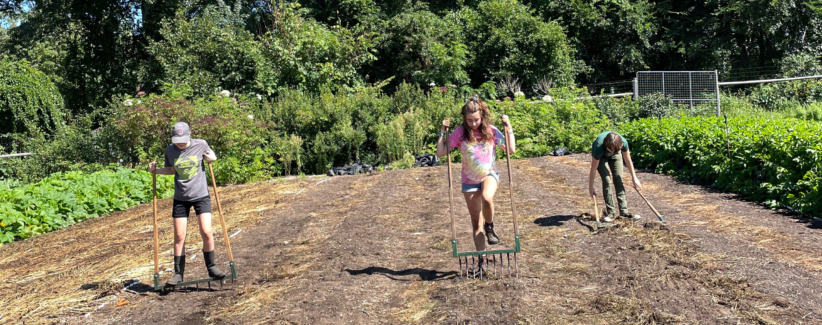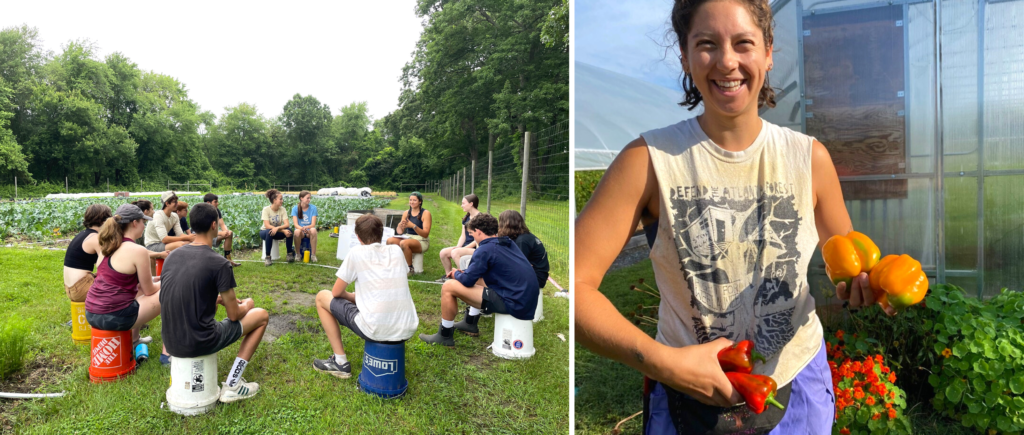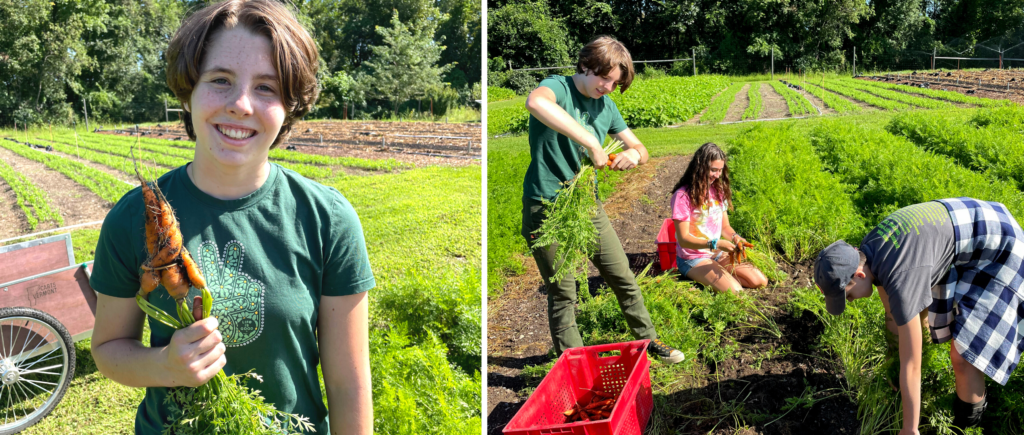Digging Into Summer Break with the High School Farm Team

We welcome thousands of volunteers to the farm each year, and almost half are youth.
Typically classrooms and families visit once or twice during the season. Yet one particular group, the High School Farm Team (HSFT), spends all summer helping our crew in the fields.
Since the program began in 2016, the HSFT—comprising students from many local communities—has become essential to our peak-season operations, while giving teenagers the opportunity to develop leadership skills, work cooperatively with peers to grow food, and, starting this year, learn about food justice.
This year, we welcomed 34 students to participate in 10 weeks of hard work, camaraderie, and personal development!
“The goal was to facilitate a space where they’re doing the work—because there’s a lot to get done—and focusing equally as much on having a joyful, meaningful experience,” said Maddie Weikel, our Assistant Grower and Assistant Volunteer Leader. “Most of the food that’s grown in this country is harvested by people working in intense and often dangerous conditions. While, through the educational component of HSFT, we try to build power to challenge such harmful land and labor practices, it is also important to harness a sense of delight for ourselves. Allowing ourselves to feel really connected to each other, the plants, and the land helps to ground us in what kind of world we want to be a part of creating.”
Among their many summer responsibilities, the crew harvested potatoes, used tools like the broadfork to prepare beds for new crops, became experts at hand weeding, and woodchipped pathways on the farm.
“They’ve shown real attention to detail and teamwork,” Maddie said. “For example, with moving and folding silage tarps—that’s a group activity that requires good communication, and technical skills. It was a challenge at first, but throughout the season they really got it down.”

For many HSFT members, a summer at Gaining Ground plants a seed of awareness about food justice and sustainable agriculture that blossoms for many years to come. This was the case for Ava Lublin, who completed the program in 2019.
“I enjoy seeing all of our hard work—our care for the land and the crops—manifesting as the plants grow and produce food that is better than anything I’ve ever bought in a store,” she said.
Fast forward and Ava is heading into her junior year of college, studying agroecology in Vermont. For the last two summers, she has returned to Gaining Ground to work full-time on the field crew.
Students learn more than farm techniques on HSFT. They also learn about the entrenched inequities—fueled by systems of exploitation and extraction—that create such a pervasive need for hunger relief in Eastern Massachusetts. They discuss how food insecurity in the United States is not a matter of low yield and crop scarcity, but rather accessibility and distribution. While they practice no-till farming, they learn why healthy soil is imperative for sustaining a food supply as the climate changes.
“I’ve learned a lot about colonization in school,” one HSFT member noted, “but I’ve never thought about its connection to the food system. It’s wild to think about how much harm goes into a lot of our food.”
Relationship building was also a priority for Maddie this year, and she began each bi-weekly HSFT session with a thoughtful activity like The Machine Game, a version of charades. Students were split into small groups and given a machine to pantomime. Then their peers had to guess if they were an oven, a ferris wheel, a dryer… Students bonded over silliness. They also recognized themselves as parts of a whole.
“Movement work is something we have to do together,” Maddie said.

One day, the group met by the Three Sisters field beds to read an excerpt from Braiding Sweetgrass by Robin Wall Kimmerer. Of corn, beans, and squash, Kimmerer wrote: “Together their stems inscribe what looks to me like a blueprint for the world, a map of balance and harmony.” With those words in mind, the students walked the farm for a few silent moments, then returned to share what beauty they had observed.
“We encourage students to experience wonder and awe for what’s going on around us,” Maddie said. “Recognizing that we’re all very small, and also surrounded by so many miracles and so much wisdom.”